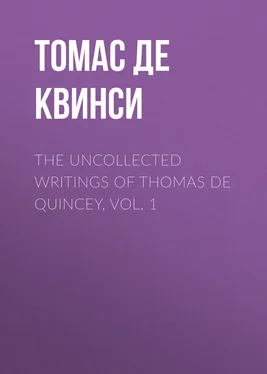Томас Де Квинси - The Uncollected Writings of Thomas de Quincey, Vol. 1
Здесь есть возможность читать онлайн «Томас Де Квинси - The Uncollected Writings of Thomas de Quincey, Vol. 1» — ознакомительный отрывок электронной книги совершенно бесплатно, а после прочтения отрывка купить полную версию. В некоторых случаях можно слушать аудио, скачать через торрент в формате fb2 и присутствует краткое содержание. Жанр: foreign_prose, literature_19, foreign_antique, на английском языке. Описание произведения, (предисловие) а так же отзывы посетителей доступны на портале библиотеки ЛибКат.
- Название:The Uncollected Writings of Thomas de Quincey, Vol. 1
- Автор:
- Жанр:
- Год:неизвестен
- ISBN:нет данных
- Рейтинг книги:4 / 5. Голосов: 1
-
Избранное:Добавить в избранное
- Отзывы:
-
Ваша оценка:
- 80
- 1
- 2
- 3
- 4
- 5
The Uncollected Writings of Thomas de Quincey, Vol. 1: краткое содержание, описание и аннотация
Предлагаем к чтению аннотацию, описание, краткое содержание или предисловие (зависит от того, что написал сам автор книги «The Uncollected Writings of Thomas de Quincey, Vol. 1»). Если вы не нашли необходимую информацию о книге — напишите в комментариях, мы постараемся отыскать её.
The Uncollected Writings of Thomas de Quincey, Vol. 1 — читать онлайн ознакомительный отрывок
Ниже представлен текст книги, разбитый по страницам. Система сохранения места последней прочитанной страницы, позволяет с удобством читать онлайн бесплатно книгу «The Uncollected Writings of Thomas de Quincey, Vol. 1», без необходимости каждый раз заново искать на чём Вы остановились. Поставьте закладку, и сможете в любой момент перейти на страницу, на которой закончили чтение.
Интервал:
Закладка:
But, from all this, results a further inference—viz. the dire affectation of those who pretend an enthusiasm in the oratory of Demosthenes; and also a plenary consolation to all who are obliged, from ignorance of Greek, to dispense with that novelty. If it be a luxury at all, it is and can be one for those only who cultivate verbal researches and the pleasures of philology.
Even in the oratory of our own times, which oftentimes discusses questions to the whole growth and motion of which we have been ourselves parties present, or even accessary—questions which we have followed in their first emersion and separation from the clouds of general politics; their advance, slow or rapid, towards a domineering interest in the public passions; their meridian altitude; and perhaps their precipitous descent downwards, whether from the consummation of their objects (as in the questions of the Slave Trade, of Catholic Emancipation, of East India Monopoly), or from a partial victory and compromise with the abuse (as in the purification of that Augean stable, prisons, and, still more, private houses for the insane), or from the accomplishment of one stage or so in a progress which, by its nature, is infinite (as in the various steps taken towards the improvement, and towards the extension of education): even in cases like these, when the primary and ostensible object of the speaker already, on its own account, possesses a commanding attraction, yet will it often happen that the secondary questions, growing out of the leading one, the great elementary themes suggested to the speaker by the concrete case before him—as, for instance, the general question of Test Laws, or the still higher and transcendent question of Religious Toleration, and the relations between the State and religious opinions, or the general history of Slavery and the commerce in the human species, the general principles of economy as applied to monopolies, the past usages of mankind in their treatment of prisoners or of lunatics—these comprehensive and transcendent themes are continually allowed to absorb and throw into the shade, for a time, the minor but more urgent question of the moment through which they have gained their interest. The capital and primary interest gives way for a time to the derivative interest; and it does so by a silent understanding between the orator and his audience. The orator is well assured that he will not be taxed with wandering; the audience are satisfied that, eventually, they will not have lost their time: and the final result is, to elevate and liberalise the province of oratory, by exalting mere business (growing originally, perhaps, out of contingencies of finance, or trade, or local police) into a field for the higher understanding; and giving to the mere necessities of our position as a nation the dignity of great problems for civilising wisdom or philosophic philanthropy. Look back to the superb orations of Edmund Burke on questions limited enough in themselves, sometimes merely personal; for instance, that on American Taxation, on the Reforms in our Household or Official Expenditure, or at that from the Bristol hustings (by its primâ facie subject, therefore, a mere electioneering harangue to a mob). With what marvellous skill does he enrich what is meagre, elevate what is humble, intellectualise what is purely technical, delocalise what is local, generalise what is personal! And with what result? Doubtless to the absolute contemporaries of those speeches, steeped to the very lips in the passions besetting their topics, even to those whose attention was sufficiently secured by the domineering interest, friendly or hostile, to the views of the speaker—even to these I say, that, in so far as they were at all capable of an intellectual pleasure, those parts would be most attractive which were least occupied with the present business and the momentary details. This order of precedency in the interests of the speech held even for them; but to us, removing at every annual step we take in the century, to a greater distance from the mere business and partisan interests of the several cases, this secondary attraction is not merely the greater of the two—to us it has become pretty nearly the sole one, pretty nearly the exclusive attraction.
As to religious oratory, that stands upon a different footing—the questions afloat in that province of human speculation being eternal, or at least essentially the same under new forms, receives a strong illustration from the annals of the English senate, to which also it gives a strong and useful illustration. Up to the era of James I., the eloquence of either House could not, for political reasons, be very striking, on the very principle which we have been enforcing. Parliament met only for dispatch of business; and that business was purely fiscal, or (as at times it happened) judicial. The constitutional functions of Parliament were narrow; and they were narrowed still more severely by the jealousy of the executive government. With the expansion, or rather first growth and development of a gentry, or third estate, expanded, pari passu , the political field of their jurisdiction and their deliberative functions. This widening field, as a birth out of new existences, unknown to former laws or usages, was, of course, not contemplated by those laws or usages. Constitutional law could not provide for the exercise of rights by a body of citizens, when, as yet, that body had itself no existence. A gentry, as the depository of a vast overbalance of property, real as well as personal, had not matured itself till the latter years of James I. Consequently the new functions, which the instinct of their new situation prompted them to assume, were looked upon by the Crown, most sincerely, as unlawful usurpations. This led, as we know, to a most fervent and impassioned struggle, the most so of any struggle which has ever armed the hands of men with the sword. For the passions take a far profounder sweep when they are supported by deep thought and high principles.
This element of fervid strife was already, for itself, an atmosphere most favourable to political eloquence. Accordingly, the speeches of that day, though generally too short to attain that large compass and sweep of movement without which it is difficult to kindle or to sustain any conscious enthusiasm in an audience, were of a high quality as to thought and energy of expression, as high as their circumstantial disadvantages allowed. Lord Strafford's great effort is deservedly admired to this day, and the latter part of it has been often pronounced a chef-d'œuvre . A few years before that era, all the orators of note were, and must have been, judicial orators; and, amongst these, Lord Bacon, to whom every reader's thoughts will point as the most memorable, attained the chief object of all oratory, if what Ben Jonson reports of him be true, that he had his audience passive to the motions of his will. But Jonson was, perhaps, too scholastic a judge to be a fair representative judge; and, whatever he might choose to say or to think, Lord Bacon was certainly too weighty—too massy with the bullion of original thought—ever to have realized the idea of a great popular orator—one who
'Wielded at will a fierce democracy,'
and ploughed up the great deeps of sentiment, or party strife, or national animosities, like a Levanter or a monsoon. In the schools of Plato, in the palæstra Stoicorum , such an orator might be potent; not in fæce Romuli . If he had laboured with no other defect, had he the gift of tautology? Could he say the same thing three times over in direct sequence? For, without this talent of iteration—of repeating the same thought in diversified forms—a man may utter good heads of an oration, but not an oration. Just as the same illustrious man's essays are good hints—useful topics—for essays; but no approximation to what we, in modern days, understand by essays : they are, as an eminent author once happily expressed it to myself, ' seeds, not plants or shrubs; acorns, that is, oaks in embryo, but not oaks .'
Читать дальшеИнтервал:
Закладка:
Похожие книги на «The Uncollected Writings of Thomas de Quincey, Vol. 1»
Представляем Вашему вниманию похожие книги на «The Uncollected Writings of Thomas de Quincey, Vol. 1» списком для выбора. Мы отобрали схожую по названию и смыслу литературу в надежде предоставить читателям больше вариантов отыскать новые, интересные, ещё непрочитанные произведения.
Обсуждение, отзывы о книге «The Uncollected Writings of Thomas de Quincey, Vol. 1» и просто собственные мнения читателей. Оставьте ваши комментарии, напишите, что Вы думаете о произведении, его смысле или главных героях. Укажите что конкретно понравилось, а что нет, и почему Вы так считаете.












